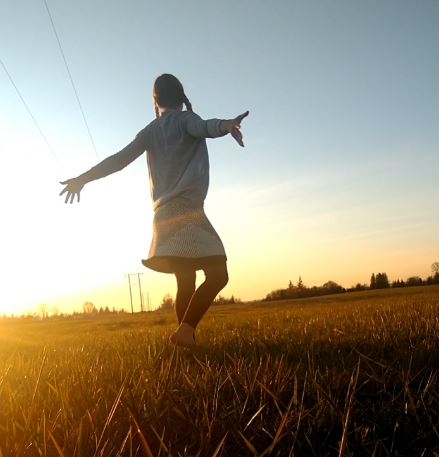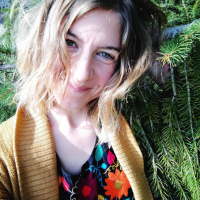
I didn’t used to be a crier.
I sucked all the tears in, a swollenness inside me, and only once in a great while, in the privacy of my room, would I open enough to allow some of these to escape through my cracks. The face I presented to the world, however, was one of “strength” and “stability,” the misguided, scared versions of these. I was terrified of my own vulnerability, so I did my best to be a safe space for others’ tears. Others’ grief. Others’ raw and healing places.
I functioned this way, quite well considering, all the way through graduate school, all the way through a Master’s degree in counseling, and most of the way through an internship as a grief counselor. But a month before finishing, grief found me in a shattering way, and suddenly I was the one who could no longer hold back the dam of tears.
My papa died, traumatically. Unexpectedly. And my world, my well-crafted defenses, my dreams, and my identity, came crashing down in a glorious, bloody heap. That was 11 years ago.
But grief has hung with me since. She moved in after he died, coming and going as she pleased. She moved back in a year later when my heart was broken by the boy I loved more than any other. And again, before getting married, when my body tore and needed my love to be mended. And again, when marriage broke both our hearts in the privacy of our own story. And again, when my heart could never fully heal from the injuries that kept occurring. And again, when I turned to the Earth for love and companionship, and found that She, too, had a broken heart.
Grief and I are so similar in that we are both so often misunderstood. Grief gets a bad reputation for being a “downer.” People are uncomfortable in her presence and may do everything they can to evict her from their homes, their lives, their online spaces. She makes them afraid—of falling into the abyss, of despair, of loneliness, of the dark, of the wild waves of emotion. They may even call her weak. They wish to prescribe things for her, not to give her a voice or a safe space to land, but to silence her.
I know. I used to be one of these people—not with others, but with myself.
Yet, more than a decade later, I am embracing Grief as an ally. A dear friend, even. She is an ever-present, palpable resident in the home of my heart. Her eyes are warm and penetrating windows, flecks of light and storm clouds. She can give herself a belly cramp, doubled over from laughter, as much as from sorrow. She craves ritual, keeps candles burning, and needs help sleeping at night. She changes clothes, often, and sometimes strips everything off at a moment’s notice to sit naked. She ignores clocks and schedules. She prefers to sink into the moment. She is vapor, she is solid, she is her own.
And she is welcome here, for she is also me. We wrap our arms around each other and hold on tight, I’ve got you, sister. We let the tears flow freely, the waves rolling through us, and in the crashing, we find our breath. We find our strength. And together, we rise with a fire in our hearts, to love and protect the Earth with everything we have, however many days we’ve been given.
I write now, most often, about ecological grief, because this is where I most sense her presence. From the struggling salmon in the creeks and rivers near me, to the otters swimming in polluted waters; the disappearing orcas in the Salish Sea; the birds tangled in fishing line; the wildfires now ravaging our state in the spring and summers; the melting glaciers and fragile Arctic; the leaking oil pipelines; the deforestation of old growth forests; the fires consuming California, the Amazon, and destroying life in Australia.
With the fiery start to this year coinciding with the intensity of Capricorn season and my birthday, one thing is emerging clearly from my sorrow: I am grounding deeper in my purpose. My work in the world—what I understand I’m alive for, my gift, and my responsibility—is becoming crystal clear.
My work, in part, is to help others make friends with Grief. To see sadness through different eyes. And to learn, together, how to partner with Grief (who is known by another name, Love) in navigating the pain of the world with active hope.
I want others to understand something mysterious, something huge: Grief is not a hindrance. She’s actually our superpower. We all know and interact with her differently, and this is good. We will each live with her in different proximities, different levels of intimacy, for we are not all the same.
But I will warn you, Grief is not for the faint of heart, and therefore, she may unintentionally crush us if we are not well supported.
It is our work to find what padding we need, not to keep Grief at arm’s length, but to let her in without crushing our spirits. That padding can take many forms—whatever practices care for your body, your spirit—supportive relationships, activism, art, music, meditation, exercise, spiritual rituals, therapy, sleep, healthy foods. Whatever it may be for you, it is your job to find it and create space for it in your life.
I am finding this padding through a more intentional practice of appreciation of life. Call it gratitude, call it beauty-seeking, call it giving thanks, call it celebration, call it whatever you like. But please, do not call it a prescription.
Grief does not need a cure; she is love. She needs our support, not our judgment. When I go through my day with an openness of sight—seeing the trees and the birds, thanking the rain, listening to the wind, feeling my breath and the steady rhythm of my heart, touching the ones I love—I fill with appreciation, and this returns to me, in abundance. The more I notice, the more that awareness grows and feeds me.
This abundance provides a cushion for Grief to settle on. And here, she does not crush me. She empowers me. No one has taught me more about joy and wonder, resilience and strength, than my teacher, Grief.
The great misunderstanding, —the tragedy—of denying or limiting or silencing Grief is that we also deny and limit and silence true joy. Sadness and joy are not exclusive. They are not dualistic names by which we measure ourselves: I am sad, therefore, I have no joy.
In the weight of Grief, most days, my senses are more acute to all the beauties of the world. It is not a “should” that those of us who are sad or grieving always feel joy, always celebrate, always express our gratitude. But I assure you, as much as I can express confidence, that the same sadness that can crush us can also break open our hearts to pure joy. We can choose this path. It is not an easy path, but it is here, inviting us into fellowship and friendship and hope—the Grief and the celebration of life.
When they hold hands, they are truly unstoppable.
“What is the duty of humans? If gifts and responsibilities are one, then asking ‘What is our responsibility?’ is the same as asking ‘What is our gift?’” ~ Robin Wall Kimmerer, Braiding Sweetgrass
So, I leave you with this seed, this thought, for you to plant and water and tend in your own life: What, dear soul, is your gift to the world?
I’m far less interested in what you do for employment. Tell me, instead: what is your life’s work, the thing you were placed here to do? What lights that fire in your spirit?
The world has so much pain, this is true, and so our gifts are urgently needed. No one is empty-handed or out of work in the economy of gifts. What would this Earth look like if we each knew our gifts and gave them freely, to the best of our abilities, each day? Can you even imagine this?
If you don’t know yours yet, keep asking, keep listening, keep trusting. And begin here, with gratitude. It’s the gift we all have in common. And it is the friend, not the opposite, of Grief.






Read 4 comments and reply